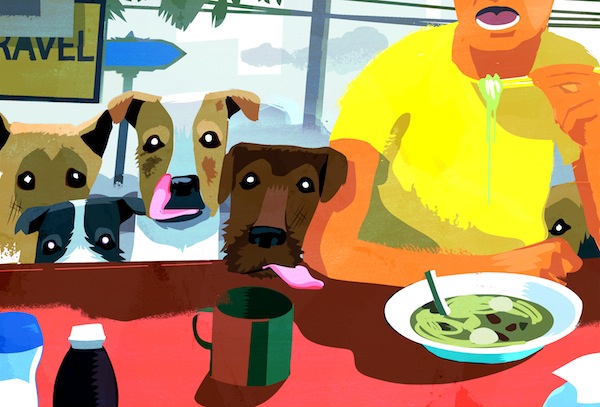OPINION – Sometimes it doesn’t hurt to slaughter a sacred cow. Especially when it’s shitting all over the sidewalk. The holy soiler of our beloved streets I’ll be examining in this article is something people often – and incorrectly – cite as one of the best things about living in Bangkok: street food.
I’ve lived here for two-and-a-half years, so I know a lot more than most people about street “cuisine.” It’s almost never organic, and it certainly doesn’t deserve to be called “artisanal.” If it contains meat, it will be the cheapest meat money can buy, meat made from animals that have endured a lifetime of sheer hell before being slaughtered, chopped into little pieces and deep-fried in two-month-old palm oil for your dubious “pleasure.”
And it’s dangerous. Where there is street food, there are rats and even worse vermin. The product has often been sitting out in the searing Bangkok heat all day before it reaches your tender insides. Sometimes, to cut costs, vendors wash plates and silverware in khlong water. We all know what goes in the khlongs – and it ain’t dish soap. People can and have died after eating street food. Ask any doctor in the city – street food is literally killer.
“But street food tastes so good,” I hear you whimper. “Don’t trash street food, it tastes so good.” To that, I give you three letters: ‘M’, ‘S’ and ‘G’. Monosodium glutamate is the dirty little secret of the dirty little street food world. This is because MSG is the easiest way a vendor with a meager budget can put out a product that tastes good. MSG is a mind-altering chemical that makes you think food tastes better than it really does. It is a lie. Street food is a lie.
And what’s so great about sitting on shitty plastic furniture, inhaling fumes and listening to engine noise while you eat, anyway? Most annoying of all, street food stalls make it a nightmare to navigate the Bangkok sidewalks, which are narrow enough as it is. Because Grandma Daeng insists on setting up her fried-banana shack on the pavement every morning, many are now less than half the width they need to be. The result is constant bottlenecks that make fantasizing about acts of ultraviolence against other pedestrians a regular feature of our daily commutes.
Yet despite the serious problems associated with street food, it remains the go-to option for two groups of people in Bangkok: the poor, and middle-class people with something to prove – namely, that they too are “street.” To the latter, I can only remark as an incredulous Ice-T once did when Vanilla Ice made that claim: “What street you from? Sesame Street?”
Let me tell you a secret, guys: the poor only eat street food because they have to. They would love to be able to eat good, honest cooking that shows respect to its ingredients. They would love to be able to sit down and enjoy a meal in an attractive venue sealed from the toxic fumes of the city. They, too, yearn to enjoy the pleasures of the Sizzler salad bar. But they can’t. You, on the other hand, have a choice. And yet, in a condescending slap in the face to poor people everywhere, you choose street food. You choose lies.
Bangkok is in dire need of a solution to the street food problem. As is often the case with issues of urban management, the city must look to Singapore for the answer. Aware of the problem since the 1950s, the authorities in Singapore moved troublesome vendors into “hawker centers” and, later, air-conditioned food courts. Happily, street food in today’s Singapore is sold in an environment the authorities can control. It’s safe, regulated and the streets of the city are a pleasure to stroll down.
Of course, Bangkok already has food courts, which are generally where the finest street food can be found. But if the city wants to become truly world class, it needs to follow Singapore in making food courts not only the norm, but the rule. Let’s clean up these streets.
Disagree with this opinion piece? Tell us why with a Coconuts Community post.
Illustration: Oliver Raw




